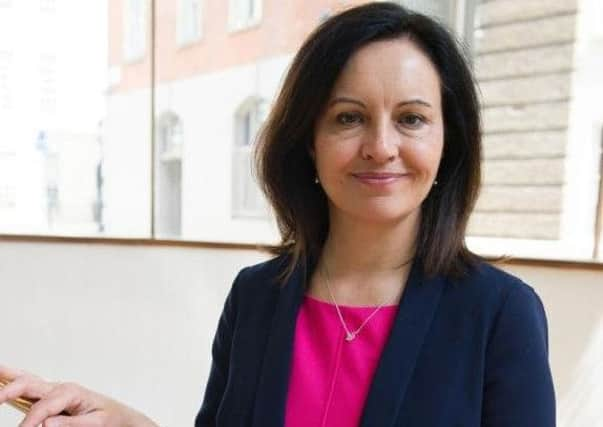Caroline Flint: I never knew my father and was the child of an alcoholic mother, but school saved me


I HAVE been an MP living in Yorkshire and serving a Yorkshire constituency for almost 19 years. I also speak as a mum, as my children went to local schools in Doncaster. When I was a new MP in 1997, I remember there were dilapidated primary schools with outside toilets. The loss of jobs in mining and manufacturing cast a long shadow over children’s potential. Back then, it cut me to the quick to hear a headteacher question whether it was worth introducing computers to schools, as the jobs that used such skills were beyond pupils’ expectations.
It is of huge concern to me that, as well as my region having a high percentage of young people who are not in education, employment or training, Ofsted states that it “lags behind the rest of the country in its task to prepare young people for the future.” In decades gone by, when manual jobs were plentiful, a 16-year-old could go straight from school to work without any or with only a few qualifications – it may have been to a low-paid job, but it was probably a job for life. That world no longer exists. We need the Government to understand post-industrial towns in Yorkshire and the north of England such as Doncaster – towns that globalisation seems to have passed by.
Advertisement
Hide AdAdvertisement
Hide AdEducation is a life-changing force. I know: it was for me. Too many children from backgrounds like mine – from ordinary working-class families – have no expectation of going to university or learning beyond 16. As someone who never knew my father and was the child of an alcoholic mother, school was all too often my refuge, a world I could embrace, from the subjects I loved to the activities such as sport, music and drama. By the time I was 18 I had lived away from home twice, during my O-levels and A-levels. Without doubt, my comprehensive girls’ school altered my path in life. It raised my aspirations, and, after attending one of the country’s first tertiary colleges, I went to university.
London and the south-east have seen results improve in recent years, but it is clear that Yorkshire and the Humber has, as Ofsted bluntly puts it, “persistently underperformed”. The truth is that that starts before children start school or even pre-school. Postcodes are a factor, but parents are the most important influence on their children. They shape their world, making many decisions – or not – every week that will have an impact on their child’s development. There is no such thing as a perfect parent, but confident and engaged parenting makes a difference.
The Government have continued a policy that started under Labour by offering free additional pre-school hours for two-year-olds; the offer is available for looked-after children, disabled children and children from disadvantaged backgrounds. With the last group, I wonder what the parents are doing while their child is in nursery. That time would seem to be an ideal opportunity to support the parents in whatever activity is likely to help them and their child’s start in life. Social inclusion, family intervention, troubled family programmes – whatever the title under different Governments over the past 20 years, it is recognised that during the early years it is crucial to offset negatives with positives where we can.
Comparisons with similar neighbourhoods are another good way to show what can be achieved and leave no room for excuses. In 2015 in Doncaster, one in three children attended primary schools that were neither good nor outstanding. In Barnsley, however, 81 per cent of pupils are in good or outstanding schools.
Advertisement
Hide AdAdvertisement
Hide AdAs with primary schools, secondary schools in Doncaster must make more progress, with just over a third of students attending a good or outstanding school compared with 79 per cent of pupils in Sheffield. The Government need to understand some of the difficulties that towns like Doncaster face. Not enough schools offer 14-year-olds diversity and a quality vocational equivalent to a more academic path.
London has its challenges but it has its opportunities too. I am jealous of the corporate and individual resources that have backed the various campaigns to get London reading, or get young people on apprenticeships. If someone wants to become an intern or gain work experience, being in London has huge advantages. Provincial towns such as Doncaster and many others have to fight much harder to provide anything similar to transform young people’s aspirations.
We may have more teachers than ever before, but they are not always the right teachers in the right places. The Government have failed to meet their own recruitment targets for four years. One primary headteacher told me that a recent job advert she posted online joined 35 other adverts for primary school teachers locally. A secondary headteacher told me that another school in the region was offering a starting salary that they could not compete with, in order to hold on to an excellent Teach First graduate.
I want the Government to consider those barriers and seek to get more good teachers to our provincial towns where the need has been identified. The Government could recognise those shortages, look at the pattern, and offer new rewards or incentives for teachers to apply for jobs in those areas.
Advertisement
Hide AdAdvertisement
Hide AdThis issue is important because life chances should not be determined by someone’s postcode or who their parents are, but in Yorkshire and Humber – and across the UK – there is clearly a hell of a long way to go.
Caroline Flint is the Labour MP for Don Valley. This is an edited version of a speech she gave as part of House of Commons debate on education.